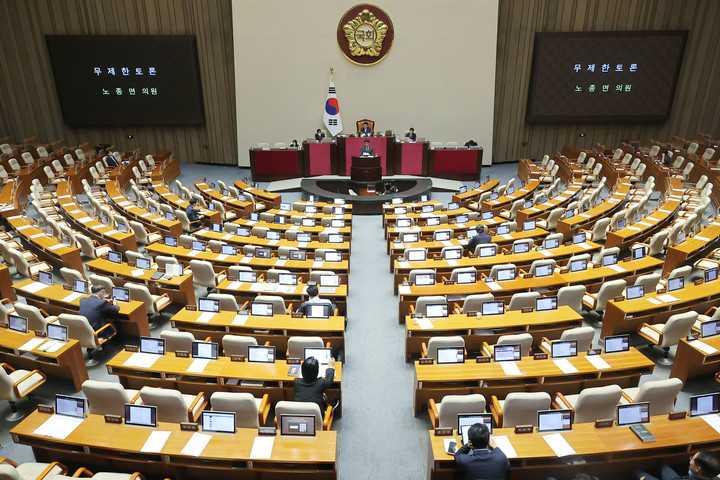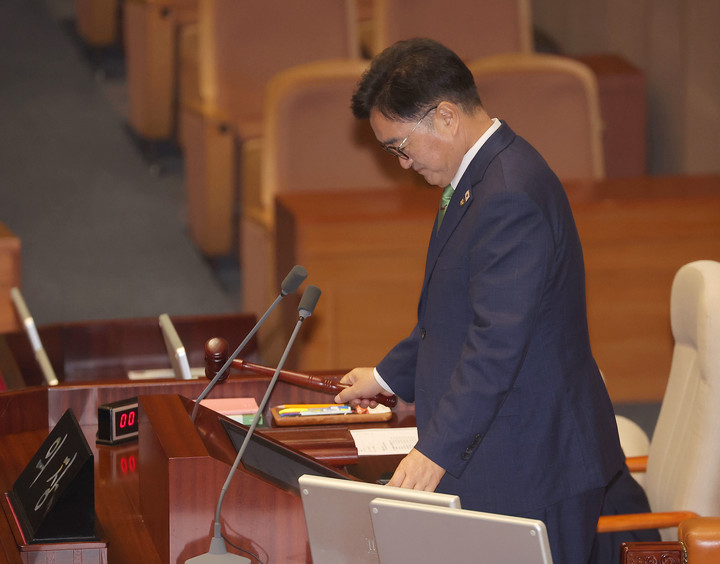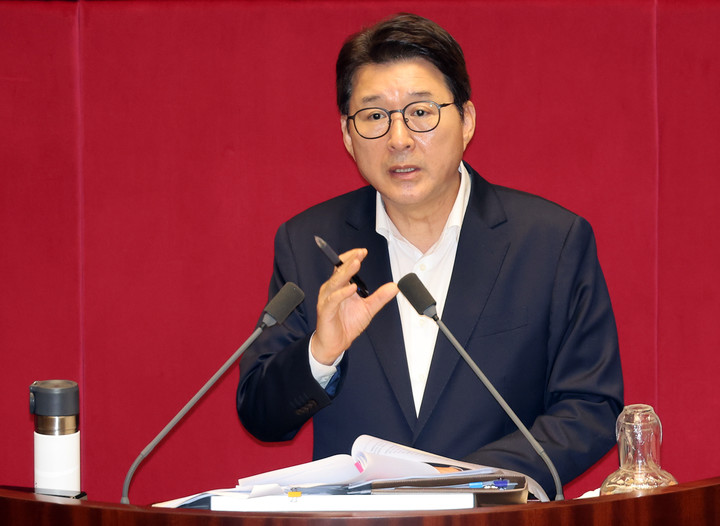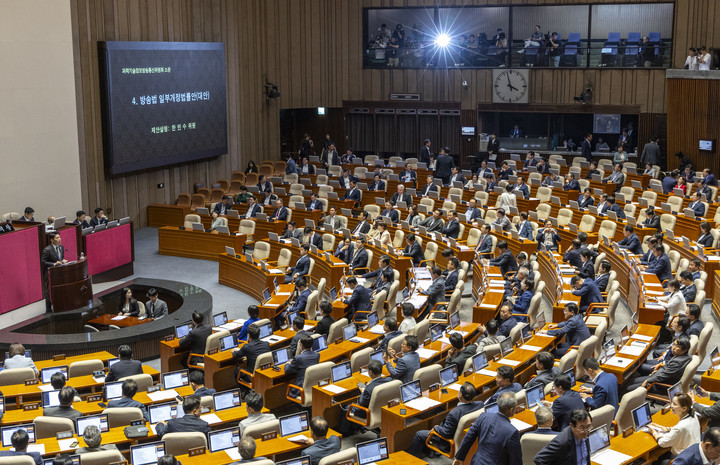Opposition and ruling parties fiercely debate the Broadcasting Act in National Assembly
Filibuster resumes as Democratic Party pushes for passage, while People Power Party strongly resists

On August 4, rival parties in the National Assembly reignited fierce confrontation over proposed amendments to the Broadcasting Act, leading to the return of a legislative filibuster for the first time in nearly a year.
The Democratic Party of Korea described the bill as legislation “returning broadcasting to the public,” and moved to put it on the floor for a vote. In contrast, the People Power Party condemned the bill as an attempt to “seize control of broadcasting,” and initiated a filibuster—an unlimited debate tactic—to stall its passage. As a result, the Assembly entered into a “filibuster standoff,” reminiscent of last July's political impasse.
Once the bill was tabled in the plenary session on August 4, the People Power Party triggered the filibuster, while the Democratic Party signaled determination to force a vote within 24 hours. Moon Jin-seok, Senior Deputy Floor Leader for the Democratic Party, stressed that the bill—which had previously been blocked by President Yoon Suk Yeol’s veto—must pass this time.
Members of the People Power Party voiced strong opposition. Representative Shin Dong-wook called the bill “a media-choking law on par with the press consolidations under the military regime of the 1980s.” He argued it would serve primarily to provide positions for pro-Democratic Party civic groups and the Korean Confederation of Trade Unions, dismissing it as “not a reform, but a Democratic Party broadcasting project.”
In contrast, the Democratic Party stated the amendment aims to enhance the public responsibility of broadcasters and secure editorial independence. Representative Kim Hyun, speaking for the party, explained the bill’s core feature: to expand the board of directors of public broadcasters and diversify nominating bodies, insisting that “broadcasting must be returned to the people.”


The showdown over the Broadcasting Act is expected to continue through the afternoon of August 5, with the pro-government bloc—having secured over 180 seats—planning to forcibly end the debate and proceed to a vote after the 24-hour mark.
Once the Broadcasting Act is addressed, a string of contentious bills—including amendments to the Foundation for Broadcast Culture Act, the Korea Educational Broadcasting System Act, the Yellow Envelope Act, and the Commercial Act—are set to be debated at the National Assembly in August.
Notably, Democratic Party leader Jeong Cheong-rae has made clear his intent to drive forward the “three major reforms,” including media reform, since taking office, further complicating cross-party cooperation.
The Democratic Party has also vowed to swiftly advance legislation on prosecutorial and judicial reforms, while the People Power Party has warned of strong resistance.
Note “This article was translated from the original Korean version using AI assistance, and subsequently edited by a native-speaking journalist.”

Photo=Yonhap News
추천 뉴스
- 1 Purple Kiss’ Sudden Disbandment Raises Unanswered Questions for K-pop Industry Less than three weeks ago, Purple Kiss released their latest single, with grand announcements of an upcoming English-language album and a North American tour. Yet today (the 4th), the girl group announced they would cease activities by November, marking a sudden exit after four years of leaving an i
- 2 'Anytime We Can' Star Hyun Bong-sik Reveals Surprising Frustration with Fellow Actor Yoo Yeon-seok On the upcoming 33rd episode of SBS’s variety show ‘Anytime We Can’, actor Hyun Bong-sik makes headlines with his candid revelation of feeling slighted by his close friend and fellow 1984-born actor, Yoo Yeon-seok.The episode, airing on August 5, features Kim Sung-kyun and Hyun Bong-sik teaming up a
- 3 Im Sung-jae Secures FedExCup Playoff Spot Despite Late Stumble at Wyndham Championship Im Sung-jae has clinched his place in the upcoming FedExCup Playoffs, following a tied 27th finish at the final event of the 2024-2025 PGA Tour regular season, the Wyndham Championship.On August 4th (local time), competing in the final round at Sedgefield Country Club in Greensboro, North Carolina,
- 4 Shin Yubin Sets Sights on Top 10 at WTT Champions Yokohama 2025 Shin Yubin, the ace of Korean women’s table tennis representing Korean Air, is set to compete against elite international players in the singles event at the WTT Champions Yokohama 2025, held from August 7 to 11 in Yokohama, Japan.The tournament stands as one of the premier events within the WTT ser
- 5 TWICE Captivates Chicago as Headliners at Lollapalooza with Unmatched Global Aura TWICE took center stage as headliners at "Lollapalooza Chicago," one of the city's most iconic summer music festivals, mesmerizing thousands of fans with their commanding global aura.On August 2nd, the nine-member group performed at Grant Park in Chicago, Illinois, joining a star-studded lineup that
- 6 Pitching Beyond Limits: The Stories of Jim Abbott and Kim Woo-jung Inspire a Generation “Whenever I stepped onto the baseball field, I never looked at my arm. I only saw my dreams.”This quote from former Major League pitcher Jim Abbott often serves as the cornerstone of my lectures. Born without a right hand, Abbott’s story transcends the concept of disability, demonstrating instead th
- 7 BoA Celebrates 25th Anniversary with Sincere 11th Album ‘Crazier’ BoA, the acclaimed singer, has released her 11th full-length album ‘Crazier’ today, commemorating her 25-year career in the music industry. Available at 6 p.m. on major music streaming platforms, this new release encapsulates the emotions and stories she has shared with her official fan club, Jumpin
- 8 National Assembly Passes Revisions to Grain and Agricultural Product Laws to Curb Price Instability On August 4, the National Assembly approved major revisions to the Grain Management Act and the Partial Amendment to the Act on Distribution and Price Stabilization of Agricultural and Fishery Products. The new amendments aim to strengthen the framework for responding swiftly to instability in the s
- 9 Ji Yoo-chan Shatters Asian Record in Swim-Off, Eyes Repeat Gold in Men’s 50m Freestyle Ji Yoo-chan, representing Daegu Metropolitan City Hall, has made history in Asian swimming by setting a new record and establishing himself among the world’s elite.On August 1, during the semifinals of the Men’s 50m Freestyle at the World Aquatics Championships 2025 in Singapore, Ji matched Amir Che
- 10 President Lee Orders Removal of Loudspeakers at Inter-Korean Border in Bid to Restore Trust On August 4, South Korea’s military began the process of dismantling anti-North Korea loudspeakers positioned along the inter-Korean border, in line with President Lee Jaemyeong’s call for “restoring trust between the two Koreas.”The Ministry of National Defense confirmed the operation, stating, “We
